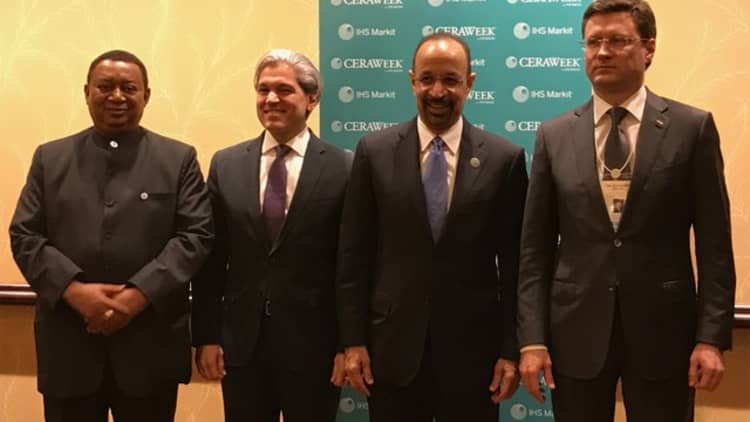
Saudi Arabia and Russia may have agreed to extend oil production cuts into 2018, but a rogue OPEC member like Iraq could still derail the plan, according to Helima Croft, global head of commodity strategy at RBC Capital Markets.
Oil prices surged 2 percent on Monday after Saudi and Russian energy ministers said they agreed producers should roll over a deal to take 1.8 million barrels a day off the market. The six-month accord, agreed to last year, is up for review when OPEC and other exporters meet next week.
Asked why oil prices hadn't rallied further on the joint announcement, Croft said expectations for an extension were already baked into prices, and the market is now asking whether two dozen exporters will accept Saudi Arabia and Russia's proposal to keeping cutting through March 2018.
"I think people will wait to see what happens at the May 25 meeting, because there could be some countries like Iraq that could say, 'We want to bring on more production. We may extend until the end of the year, but we're not signing up going into 2018," she told CNBC's "Closing Bell" on Friday. "So the details are not finalized yet."
Iraq, OPEC's second-largest producer, initially balked at the current six-month deal, asking to be exempt because it needs oil revenue to fight ISIS militants. Iraq also quibbled over the benchmark against which the cuts would be measured.
After relenting and joining in the deal, Iraq's oil minister raised eyebrows in March when he said his country could raise output to 5 million barrels a day in the second half of 2017. By April, Baghdad had still not reduced its production to the level it agreed to in November.
Saudi Arabia and Russia must get 12 OPEC members on board, and then secure buy-in from 10 other exporters. Already, Kazakhstan, one of the 11 non-OPEC parties, has said it cannot maintain its output reductions at the current level, Reuters reported.
A nine-month extension could make some of those countries less willing to commit to rolling over the deal, said Tamar Essner, senior director of energy and utilities at Nasdaq Corporate Solutions.
An oil price recovery that has been underwritten by OPEC's cuts is also vulnerable to rising output in Libya and Nigeria, Essner added. The two OPEC members are exempt from output cuts as they seek to restore capacity sidelined by internal conflicts.
'New oil order'
That said, Russia and Saudi Arabia represent a "new oil order," according to Croft.
The two floated the idea of freezing production in January of 2016 — a plan that fell apart in April after the influential Saudi deputy crown prince reportedly withdrew his support. However, that partnership re-emerged in the fall when Riyadh and Moscow agreed to jointly monitor the oil market and work to keep prices stable, Croft said.
"This has been a long time coming, and what's interesting is I think the Russians have friends on all sides in the Middle East," she said.
The Russians can back President Bashar Assad in Syria's civil war and maintain relations with Iran, both Shiite powers, but still cut deals and keep ties with Sunni-dominated states like Saudi Arabia and the United Arab Emirates, she said. That shows Russia has filled the power vacuum in the Middle East, she added.
Analysts on Monday told CNBC there are several reasons why Saudi Arabia and Russia may continue to cooperate with one another.


